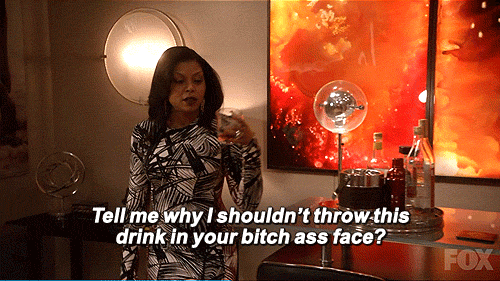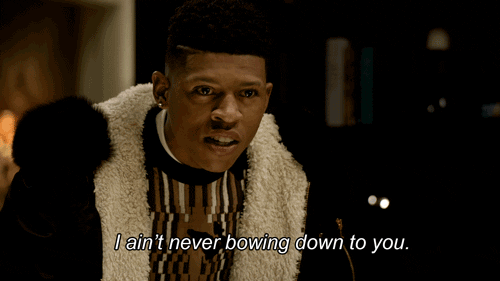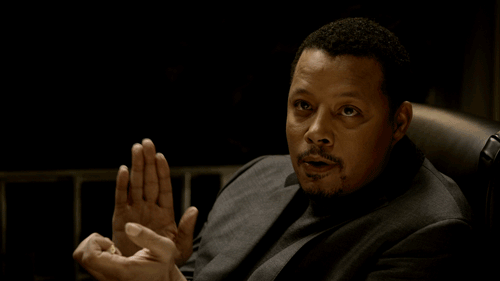Text
Summary
Unfortunately, we still live in a world where racism is still a viscous virus. Now it may not be as clear cut and in your face as it used to be, but racial bias remains as an undertone of our society. As someone who used to watch Empire and decided to rewatch it again after writing my first post I caught all the things I missed the first time. While Empire does try to tackle things such as homophobia and mental illness in black culture, is still promotes stereotypes of black men and women. A pleasant surprise in this research is the film I chose is the origin story for the organization I chose. Seeing where Bryan Stevenson began in Just Mercy and where his organization for EJI is today. Bryans actions created a ripple effect that made EJI come as far as they have.



0 notes
Text




EJI was founded in 1989 by Bryan Steveson, the famous lawyer and author of “Just Mercy.” EJI is a “private nonprofit organization that provides legal representation to people who have been illegally convicted, unfairly sentenced, or abused in state jails and prisons.” EJI challenges the death penalty, unjustified punishment, and provide services for people who have been incarcerated back into the world. The reason this organization is necessary is because of how black people are treated in the system. Such as the very reason Bryan Stevenson created the organization in the first place. Bryan Steven traveled to the South as a lawyer fresh out of law school to help represent people who cannot afford legal help. Bryan Stevenson represented many of whom were on death row. While Bryan represented many clients, Walter McMillian was his most famous. Walter McMillan was a black man on death row who was wrongly convicted of murdering a white girl. In Walter McMillan case there was extraordinarily little evidence to incriminate Walter and it was coerced by people in power. Things like that do not happen anymore, yet there are injustices that happen every day against people of color. These injustices occur when people do not have proper representation and wealth to get that representation. EJI states “In the American criminal justice system, wealth—not culpability—shapes outcomes.” The very reason why EJI was created.
EJI believes that “ “ tough on crime” policies that led to mass incarceration are rooted in the belief that Black and brown people are inherently guilty and dangerous—and that belief still drives excessive sentencing policies today.” In order to truly cause change will be to change the perspective of the American people. “We are committed to changing the narrative about race in America.” Just like many of Artist in this world using their Art to change perspective of the American people. Such as Glenn Ligon's work highlighting his black and white features. EJI is changing the minds of the people one case at a time. By showing that the statics of black criminals is nothing more than a manipulated statistic and that racist bias is the true cause of it.
Citations
Equal Justice Initiative, 21 June 2022, https://eji.org/.
0 notes
Text
Tumblr Post 2: Just Mercy



Just Mercy was released in 2019 as an American biographical legal drama film co-written and directed by Destin Daniel Cretton and starring Michael B. Jordan as Bryan Stevenson, Jamie Foxx as Walter McMillian, Rob Morgan, Tim Blake Nelson, Rafe Spall, and Brie Larson.” It is a story about a young lawyer traveling to the South to help represent people who cannot afford legal help. All the clients Bryan Stevenson (Michael B Jordan) represents are black and many of them are on death row. While Michael represents all of them the prime focus of the film is on Walter McMillian. A black man on death row who was wrongly convicted of murdering a white girl. The only evidence that they have on Walter is a single testimony by another inmate. The film consists of Bryan being harassed and even threatened by police officers and southern citizens as there not happy Bryan is trying to help these “animals.” The trials go all the way to the supreme court where all Walter's charges are finally dropped.
“The true measure of our character is how we treat the poor, the disfavored, the accused, the incarcerated, and the condemned.” A key quote made by Michael B Jordan in the movie. It is a strong commentary on how Bryan the lawyer was treated for trying to help these people. In the beginning of the movie when Bryan was introducing himself to the inmates, they sent him into a room where he was strip searched as a new inmate would. This was not the only time Bryan was treated as criminals much like his clients he was representing. Such as police harassment and several forms of stone walling from the opposing persecutors. This gives the viewers a clear view of how the inmates were treated if they were willing to go this far against their lawyer.
Just Mercy puts a spotlight on how African Americans were treated back then, and how they can be mistreated today. Walter's case was one of the worst examples but another big one was highlighted. A war veteran that suffered from PTSD had a major break in his psychosis that brought him back to the war. He placed a bomb underneath a house and killed a woman. Instead of giving the proper treatment and mental help he was placed on death row and was executed.
0 notes
Text
TUMBLR Blog #1: Empire




Empire is a predominantly black series created by Lee Daniels and Danny Strong for Fox that first aired in 2015 and was canceled in 2020 due to Covid. The premise of the show is a hip-hop mogul and founder and CEO of Empire Entertainment, and how his ex-wife and his 3 sons battle for the throne. Being a soap, it is filled with cutthroat drama and extremes to keep viewers interested. That being said, this award-winning show can be accused of misrepresenting black culture by capturing and exaggerating black stereotypes to create humor and to keep the plot interesting. For example, Lucious Lyon (CEO of Empire Entertainment) was able to create Empire from the money he made from being a drug dealer. Another example is how they portray Lucious’ ex-wife, Cookie. Cookie is shown as a violent angry black woman that has complicated relationship with her kids. That includes tons of love and affection, followed by beatings when they disobey her.
Yet many would argue that the show is breaking down certain black stereotypes. By forcing the viewers to judge the characters early on, followed by learning what caused those stereotypes; either from hardship or deep-rooted fear.
Another theory is that the writers were essentially recreating what Blackface minstrels did. “Basically, Empire wasn’t created to entertain black people (although I’m sure it has black viewers). It is instead selling an image of blackness to a predominantly white audience that has long been fed stereotypical messages about what blackness represents,” (Watkins). When in actual reality 61% of the viewers were reported to be black in 2018 from USA Today.
To represent how Empire portrays race, I have chosen 3 characters who seem to carry the most stereotypes.
“Lucious Lyon (born Dwight Walker) is the main protagonist and antihero in the television drama, Empire.” (Empire wiki). Lucious from start to finish could be described as a criminal throughout the show. In the beginning he was a drug dealer so he could get enough money to start the company. Once the company was a multi-million-dollar establishment he lies, cheats, steals, and kills people out of cold blood to stay in power. They try and mitigate the hatred for the character by showing that Lucious’s mom was bipolar and tried committing suicide several times followed by him running away from home at an early age and living on the streets.
Cookie is a well-rounded favorite on the show as Taraji P. Henson brings the character Cookie to life. In many aspects, the role portrays a positive image for black women. Cookie was successful, confident, and in the end always loyal to her family. However, “Cookie is the embodiment of all the stereotypes black women face on TV. Dressed flamboyantly with floor-length furs, color-coded nails and eyelashes big as a manhole covers, she is quick to anger and ready to throw down at a moment's notice" (Deggans).
“Hakeem, first introduced as the youngest, lively, fame-hungry son, seems to get to his head” (Empire wiki), but it does not stop there. Throughout the show, the character Hakeem is often seen as reckless, arrogant, and unintelligent. The writers try giving sympathy to the character by showing that he was born into a dysfunctional family and motherless until the age of 17 as the cause of his problems. Hard to say if these are stereotypes of a young black man or just a boy born into extreme wealth. None the less Hakeem was hardly painted in a positive way.
The show leads me to think if the media is really trying to create equality for all or is it just a cover to have a diverse cast while still portraying the same stereotypes?
Citations
Carlton, Kenya. “The Curious Case of 'Empire' and Its Representation of Black Life on TV.” For Harriet | Celebrating the Fullness of Black Womanhood, 21 Mar. 2015, http://www.forharriet.com/2015/03/the-curious-case-of-empire-and-its.html.
Lawler, Kelly. “Study: How Diverse Are the Audiences for 'This Is Us,' 'Empire,' 'Westworld'?” USA Today, Gannett Satellite Information Network, 29 June 2018, https://www.usatoday.com/story/life/tv/2018/06/28/how-diverse-audiences-us-empire-westworld-nielsen/738216002/.
Deggans, Eric. “Does Fox's 'Empire' Break or Bolster Black Stereotypes?” NPR, NPR, 18 Mar. 2015, https://www.npr.org/2015/03/18/393785570/does-foxs-empire-break-or-bolster-black-stereotypes.
“Category: Characters” Empire TV Show Wiki, https://empire.fandom.com/wiki/Lucious_Lyon.
(@ChuckCreekmur), Chuck Creekmur. “Dr Boyce Watkins: Here's Why I Won't Support the Coonery of ‘Empire.’” AllHipHop, 20 Jan. 2015, https://allhiphop.com/uncategorized/dr-boyce-watkins-heres-why-i-wont-support-the-coonery-of-empire/.
7 notes
·
View notes